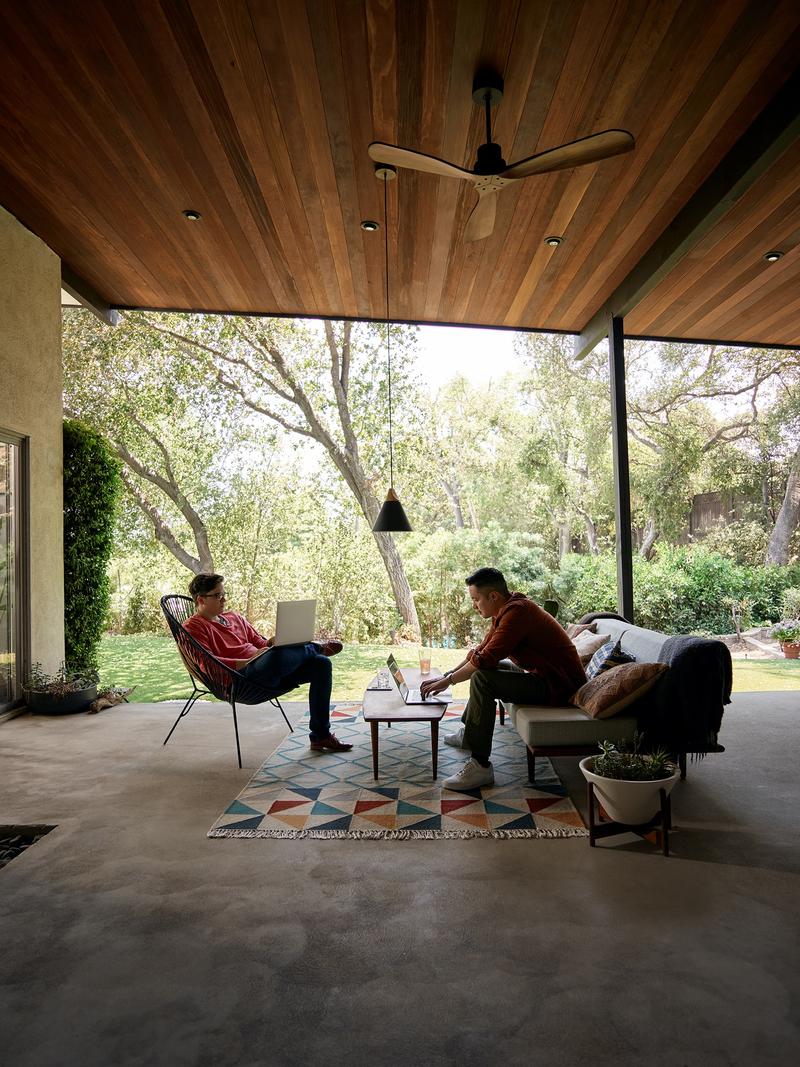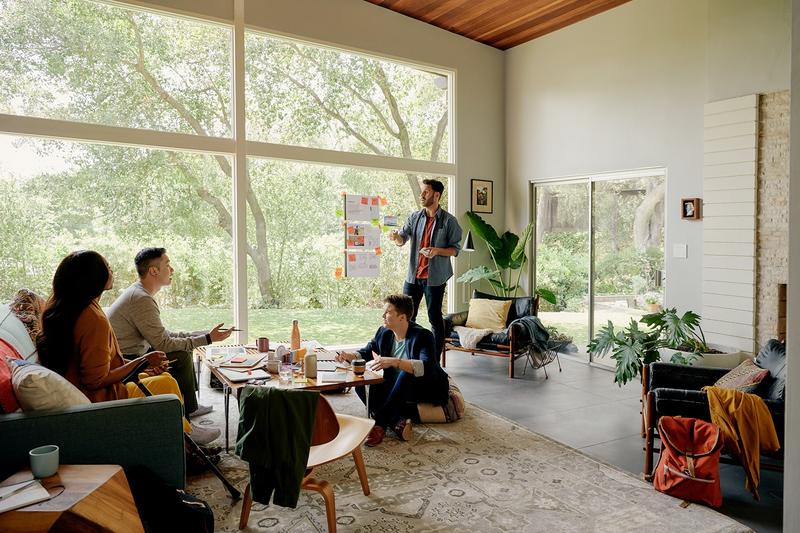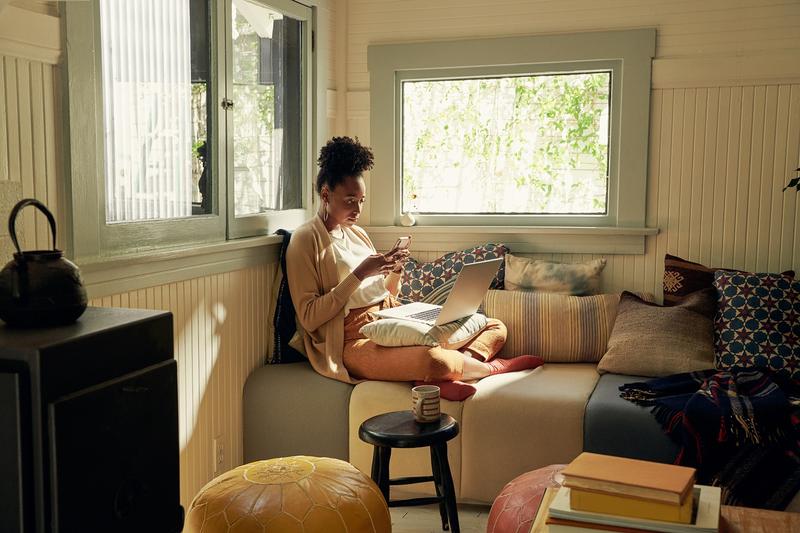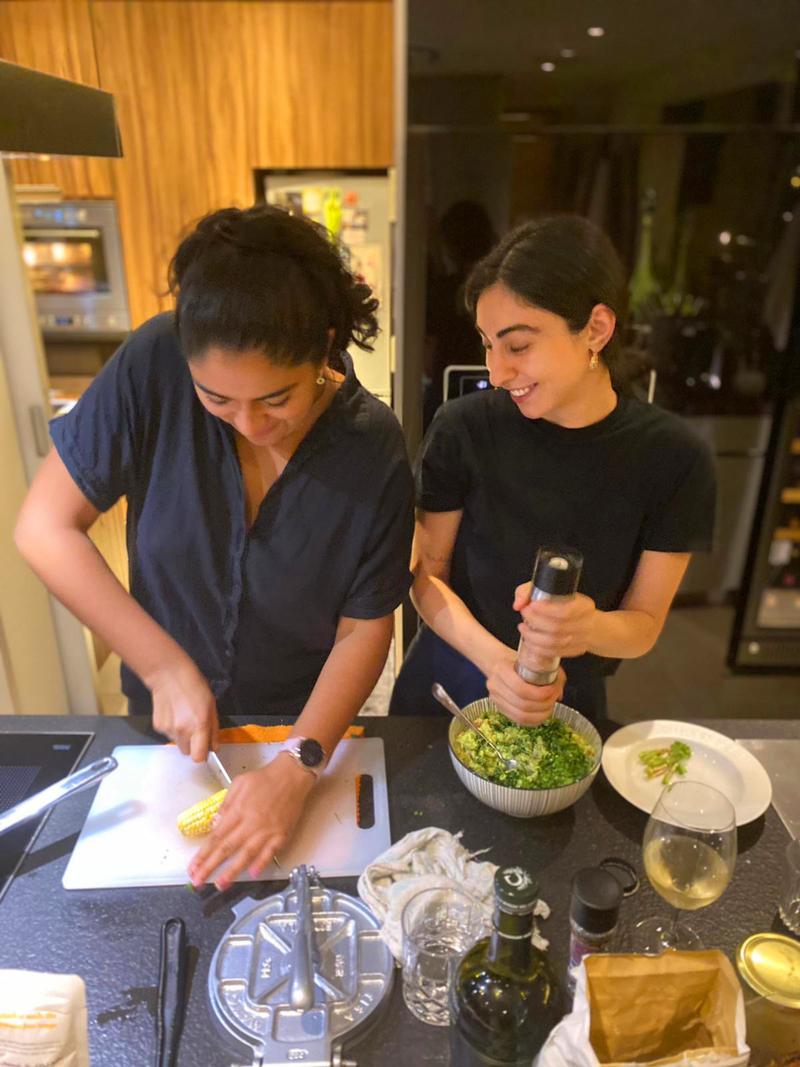COVID-19 caused a tectonic shift in Hong Kong Airbnbs, widening their customer base to include locals seeking a break from routine and professionals looking for remote working spaces. Joyce Yip reports.
 Airbnb has positioned itself to appeal to post-pandemic digital nomads, for whom remote working is the new normal. Bookings on the platform for long-term stays reached an all-time high in quarter one of 2022. (PHOTO PROVIDED TO CHINA DAILY)
Airbnb has positioned itself to appeal to post-pandemic digital nomads, for whom remote working is the new normal. Bookings on the platform for long-term stays reached an all-time high in quarter one of 2022. (PHOTO PROVIDED TO CHINA DAILY)
While it might be unusual to find a poet, a chef and a chocolatier under one roof, this is just the kind of gathering Sacha Van Damme and Pamela Dabdoub would host at their permaculture farm in Clearwater Bay. On this occasion however, the event is being held at a nearby, three-bedroom Airbnb. Arranged on a long table are clouds of homemade fairy lights in jars, plates with orange napkins, and a feast of Mexican favorites including enmoladas (stuffed corn tortillas dipped in mole sauce), tacos and guacamole — to be washed down with mescal cocktails.
Co-founder of the Mexican retail shop Freida Club, Dabdoub says she chose the venue for its large, open kitchen.
“We can feel very stressed in our homes, and we don’t have these nice open kitchens. With an outside venue, all you need to bring are good food and good vibes,” she says. “We haven’t traveled since the beginning of 2020, so hosting friends in someone else’s home feels like an adventure. It’s a chance for everyone to learn something new — toss a salad, mix the guac — in a new place.”
 Airbnb has positioned itself to appeal to post-pandemic digital nomads, for whom remote working is the new normal. Bookings on the platform for long-term stays reached an all-time high in quarter one of 2022. (PHOTO PROVIDED TO CHINA DAILY)
Airbnb has positioned itself to appeal to post-pandemic digital nomads, for whom remote working is the new normal. Bookings on the platform for long-term stays reached an all-time high in quarter one of 2022. (PHOTO PROVIDED TO CHINA DAILY)
Madelon de Grave — founder and CEO of local photography gallery Bamboo Scenes — checked into an Airbnb property on Lamma Island for a completely different reason: to switch off. When a planned trip to the Netherlands was scuppered by a flight ban, de Grave set up a substitute holiday for herself with a simple program of yoga, walks on the beach, reading and, most importantly, a break from her devices.
“The property was a cozy family home where I had the rooftop to myself,” says de Grave, adding that she hasn’t left Hong Kong in two years. “Of course we can go hiking every weekend to disconnect, but at some point it gets a bit draining to be working all the time without proper breaks. I did nothing on Lamma — and it felt great.”
 Airbnb has positioned itself to appeal to post-pandemic digital nomads, for whom remote working is the new normal. Bookings on the platform for long-term stays reached an all-time high in quarter one of 2022. (PHOTO PROVIDED TO CHINA DAILY)
Airbnb has positioned itself to appeal to post-pandemic digital nomads, for whom remote working is the new normal. Bookings on the platform for long-term stays reached an all-time high in quarter one of 2022. (PHOTO PROVIDED TO CHINA DAILY)
Digital nomads
As COVID-19 and long hours of working from home persist, hotel staycations may no longer be sating the appetite of the travel hungry, let alone curing cabin fever — especially in a city known for having the smallest apartments in the world.
Over the past year, new research studies have looked into the mental fallout caused by prolonged periods of confinement — making getaways from home not just a luxury, but a necessity during the pandemic. Last year, Airbnb saw more of its worldwide users embark on a “nomadic lifestyle” — meaning that half its bookings were for weeklong stays. Bookings for long-term stays — defined as stays of at least four weeks’ duration — reached an all-time high in the first quarter of this year, more than doubling year-on-year. On average, 1 in 5 Airbnb bookings is for a long-term stay.
Global flight restrictions notwithstanding, the company reported a strong Q4 2021, with net income topping $55 million — an improvement of $3.9 billion year on year. International travel, as far as Airbnb is concerned, is back.
“Travelers want amenities for living, not just visiting. They’re seeking out Wi-Fi, workspaces and kitchens, in keeping with the shift toward remote work and living anywhere,” says Amanpreet Bajaj, Airbnb’s general manager for India, Southeast Asia, Hong Kong and Taiwan. Globally, the most sought-after amenities are pet friendliness, a pool, Wi-Fi, kitchens and free parking.
 Pamela Dabdoub (right) hosting her Mexican-themed dinner party last winter. She chose the venue, an Airbnb in Clearwater Bay, for its spacious open kitchen — a feature not commonly found in Hong Kong homes. (PHOTO PROVIDED TO CHINA DAILY)
Pamela Dabdoub (right) hosting her Mexican-themed dinner party last winter. She chose the venue, an Airbnb in Clearwater Bay, for its spacious open kitchen — a feature not commonly found in Hong Kong homes. (PHOTO PROVIDED TO CHINA DAILY)
Closer to home
John Roe (not his real name) — who manages a fourth-floor walk-up in Causeway Bay listed on Airbnb — says that while earlier typical clients were visitors from overseas, in the past couple of years he has catered mostly to Chinese-mainland students looking for a place to quarantine (not a requirement any more), locals getting ready to emigrate after their apartment lease has ended, and the occasional young couple seeking a break from routine.
“The demographic has truly changed. In the eight years I’ve been an Airbnb host, I never used to have people moving out of Hong Kong or nontourists,” says Roe.
Another host, William Chan (not his real name), says the 60-plus local Airbnb properties he manages have been rented as self-isolation spaces by medical staff, as well as office spaces by professionals required to work from home.
“At the peak of the pandemic, when a lot of office staff were working remotely, I had a few customers who were just here for the Wi-Fi and desk space. They’d come in the morning, and the bed would remain untouched. I imagine they don’t have a very convenient space at home to host calls and do their work,” Chan muses.
 Shravani Bhattacharyya, psychotherapist and psychology researcher. (PHOTO PROVIDED TO CHINA DAILY)
Shravani Bhattacharyya, psychotherapist and psychology researcher. (PHOTO PROVIDED TO CHINA DAILY)
Breaking out
Shravani Bhattacharyya — a psychologist and psychotherapist as well as a researcher on the 2021 study Exploring Human Connections With Living Spaces During the COVID-19 Pandemic — says our need for a getaway could be explained by the existence of a conflict between our workplace and home selves.
“When our living space is also a workplace, our connectedness with the room declines,” Bhattacharyya notes. “We (then) have thoughts like: ‘Everything happening around me (is) out of control’ — resulting in unhelpful emotions like anger, stress and fatigue. We crave getting away because we need a physical demarcation between work and personal life.”
A change in setting doesn’t just keep negative emotions at bay: It actually stimulates the brain to stay motivated and creative, and make lasting memories. In a study performed last year by Catherine Loveday, a professor of cognitive neuroscience at the University of Westminster, 80 percent of the participants said at least one aspect of their memory had deteriorated during lockdown. Subjects reported forgetfulness across a range of settings: from failing to recall previously shared information or a promise made, to forgetting when an event or incident had occurred, and even struggling to find the right words when speaking.
Environmental stimulation is critical to the brain, says Bhattacharyya.
“When you’re in the same physical environment for a long time, your mind gets attuned to your surroundings,” she notes, adding, “A change of environment helps in diversified brainstorming sessions for creativity.” For those stuck at home while performing professional duties, Bhattacharyya suggests bringing plants into the work environment. As she explains, biophilic design elements in green and blue promote relaxation, combat fatigue and spark creativity — leading to more “Aha!” moments.
 Amanpreet Bajaj, Airbnb’s general manager for India, Southeast Asia, Hong Kong and Taiwan. (PHOTO PROVIDED TO CHINA DAILY)
Amanpreet Bajaj, Airbnb’s general manager for India, Southeast Asia, Hong Kong and Taiwan. (PHOTO PROVIDED TO CHINA DAILY)
Blurred lines
Airbnb’s Bajaj predicts more frequent and flexible travel post-pandemic as employees are increasingly no longer confined to the office.
“Travel is on track to not only recover and then grow, as more people gain the flexibility to pursue it as a way of life, but (also) to recover and grow in a healthier way, as it takes place in more communities and benefits more people,” he says, adding that travel is now a combination of work, sightseeing and living.
“People are no longer just looking for popular attractions.”
Since the gathering at the Airbnb property in Clearwater Bay last winter, Frieda Club’s Dabdoub has hosted another in Mui Wo, and says she’s keen to make such events a regular fixture.
“I loved that experience: it makes you feel like you’re a little kid again — it’s authentic for everyone,” Dabdoub enthuses. “It’s awesome to explore other people’s homes, like we’re off to somewhere far away on vacation.”


